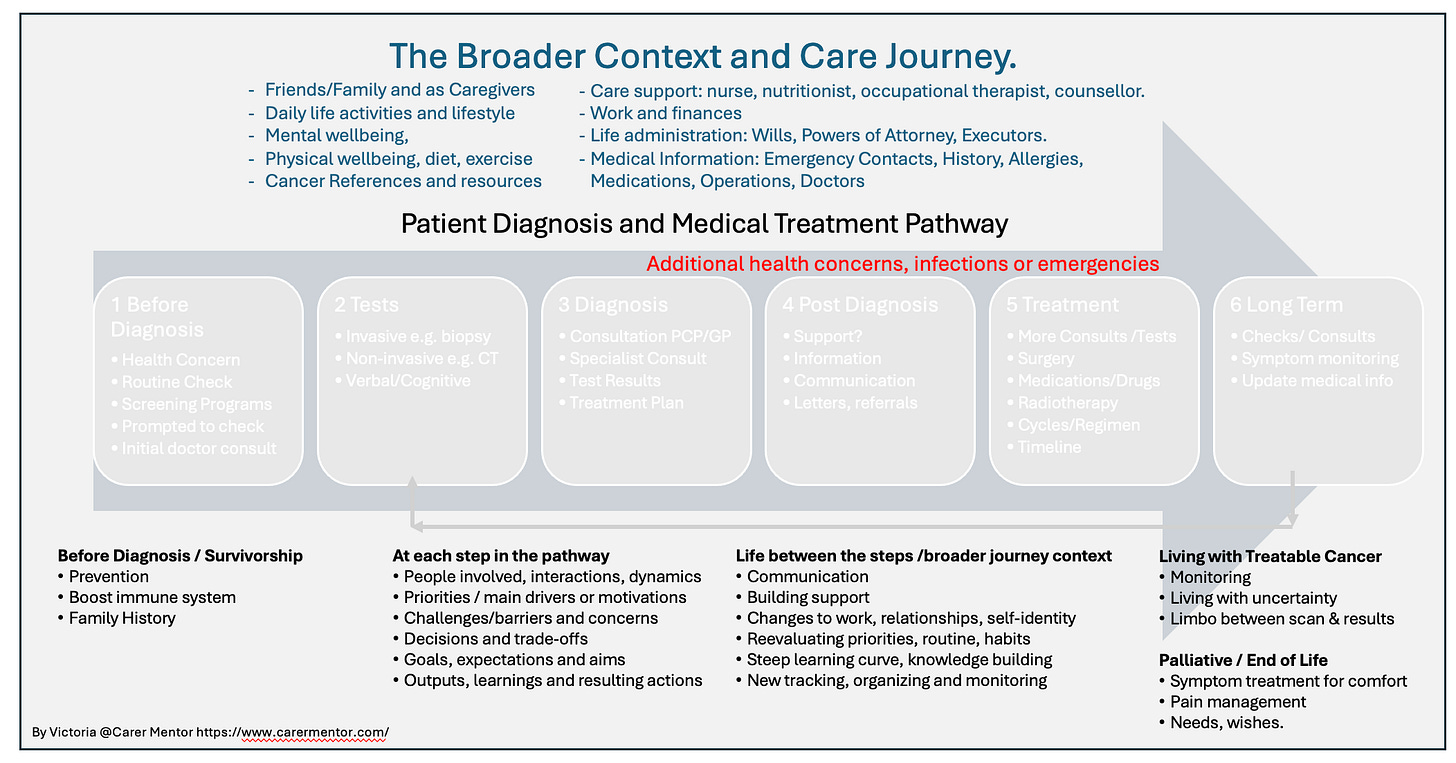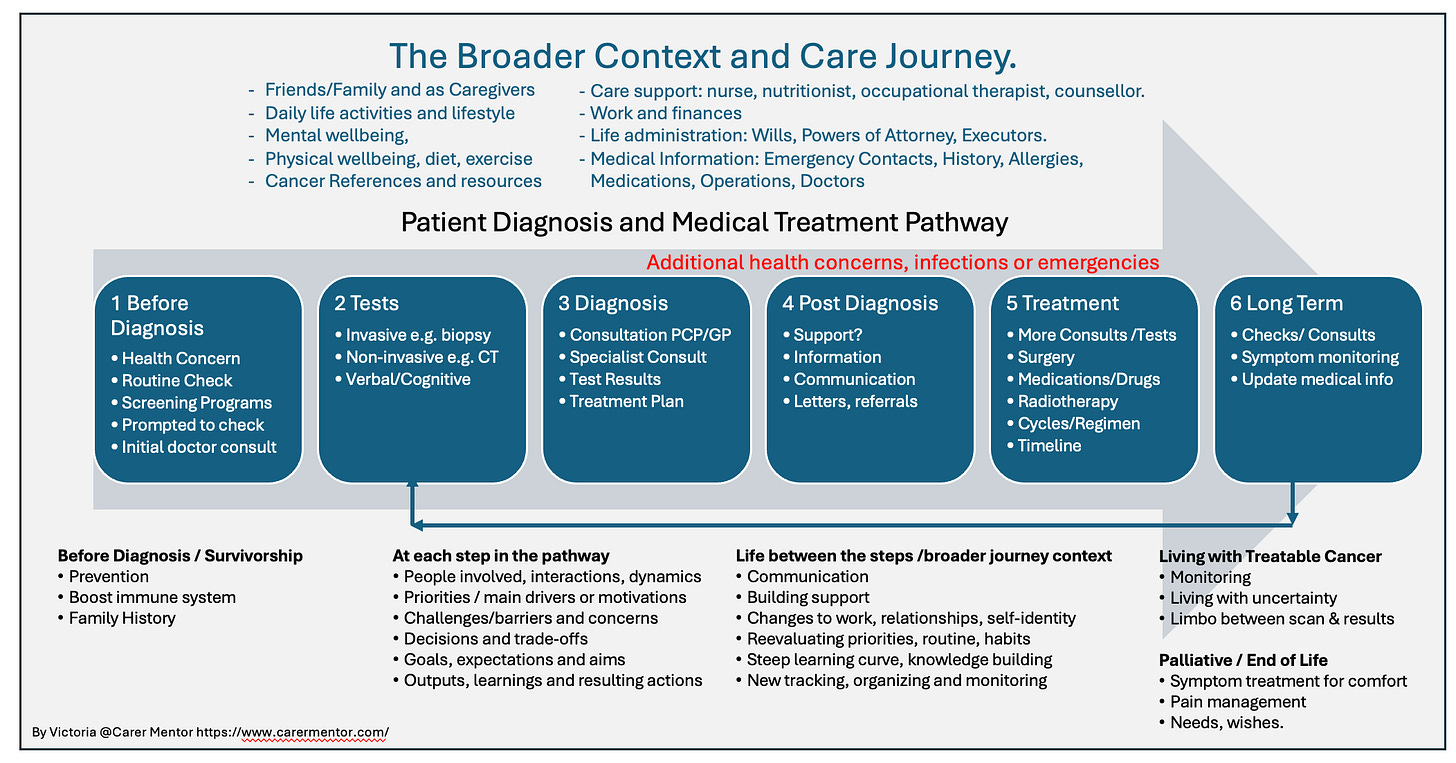#2 The Cancer Care Journey: The Broader Context.
What considerations/factors influence cancer treatment beyond the medical steps? Seeing and caring about the whole person and their life beyond the medicine/treatment journey.
In this publication, I’m building a space where we can fully appreciate each cancer experience and share empathy and insights via the community network.
Hello, Dear Readers and new members of the Carer Mentor Community!
This second article is part of The Cancer Care Journey, which is housed in the iCARE Stack of Carer Mentor.
This is about expanding our lens of cancer and treatment to appreciate each patient's broader care context and life.
The first article was an Introduction: The Cancer Care Journey, an Insights Map of Lived Experiences.
Recap of The Cancer Care Journey Initiative By Carer Mentor
In January, I wrote the premise for a significant amount of my writing work this year: ‘Why iCARE about Cancer. Past and present events that underscore World Cancer Day for me.’
For World Cancer Day (February 4th), I collaborated with other writers/creators to publish iCARE: The Cancer Anthology for and by those with cancer and their caregivers (aka everyone around them).
Today, this empathy and inspiration focused on Cancer continues with ‘The Cancer Care Journey.’ I'm building an evolving reference map of insights1 and enlisting collaboration support through a new Carer Mentor Kinship initiative2.
The focus is not only on the person diagnosed with cancer but also on the caregiver, friends, family, doctors, nurses, and broader care support.
The aim is to provide a big-picture overview leveraging insights from many sources, e.g. my personal experiences, the iCARE: Cancer Anthology, the Carer Mentor Kinship (support network), Macmillan Cancer Support, Carers UK and other published evidence/peer-reviewed articles and experts.
This is an opportunity to build an anthology of experiences to serve others and amplify the words/work of writers, creators, and organisations.
Carer Mentor is a hub, portal for its community, and networking agent.
It’s about sharing chapters from our experiences to generate more actionable insights, questions, and tips and explore the different facets of the cancer care journey in greater depth.
When those first tests and consultations are performed, many people feel lost and overwhelmed by all the information and booklets they’re given. It can feel isolating.
Using a simple framework of a cancer journey, we can map diverse real-life experiences, compare thoughts/events and connect/support each other more easily.
Each experience is unique because each person’s circumstances are unique.
Offering a spectrum of insights can give readers different snapshots of what fits their situation and what questions or mindsets make sense for it.
The information here is NOT medical advice (always seek advice from your doctor).3
The Cancer Care journey of unique LIVED experiences needs to involve more than ‘just’ the medical treatment/interventions or steps in a path. For example,
the human experiences of how we navigate Cancer.
how we, as the patient/caregiver/friend/family, engage with doctors, medical professionals and support organisations, and they with us, to optimise our care, health, and outcomes
actions we can do or questions we can ask to minimise potential disconnects in information/communication
building stronger relationships through trust and alignment
seeing the big picture and details to understand what we need to know to empower, support and advocate for ourselves, our friends, and our family along the Cancer Care Journey.
What considerations/factors influence cancer treatment beyond the medical steps?
The Cancer Care Journey: The Broader Context
This article highlights the broader Context considerations of a patient’s diagnosis and medical treatment.
How a patient responds to a treatment is influenced by their life. This may seem obvious, but when we consider relationships, lifestyle, support professionally and personally, and finances, we can better imagine the potential impact, stress and anxiety that may surround everyone involved as they navigate cancer.
Some considerations I’ve noted:
Friends/Family and Caregivers
Daily life activities and lifestyle
Mental wellbeing. Neurodivergence. Cognitive disability or neurodegenerative illness.
Physical well-being. Physical disability or chronic health condition/illness.
Diet, exercise
Cancer awareness/knowledge and access to references and resources
Care support: nurse, nutritionist, occupational therapist, counsellor.
Work: environment, colleagues, workload flexibility,
Income and finances
Life administration: Wills, Powers of Attorney, Executors.
Medical Information: Emergency Contacts, History, Allergies, Medications, Operations, Doctors’ contact details.
Let’s ensure we see the whole life context of someone with cancer.
What other considerations would you highlight?
The Diagnosis and Treatment Pathway
There are life-context considerations, as I shared above, and then there’s thinking about navigating each step of diagnosis and treatment4. — consulting with a doctor, talking to a support organisation, negotiating about work responsibilities and time off.
I’ve noted various considerations alongside each diagnosis/treatment pathway step—aspects to explore through lived experiences.
At each step in the pathway
People involved, interactions, and dynamics
Priorities / main drivers or motivations
Challenges/barriers and concerns
Decisions and trade-offs
Goals, expectations and aims
Outputs, learnings and resulting actions
Life between the steps /broader journey context
Communication
Building support
Changes to work, relationships, self-identity
Reevaluating priorities, routine, habits
Steep learning curve, knowledge building
A different kind of administration: tracking, organising and monitoring appointments and letters to ensure we’re clear on the purpose of each interaction/medical step or how/where the patient ‘case’ is discussed.
Living with Treatable Cancer
Monitoring
Living with uncertainty
Limbo between scan & results
Palliative / End of Life
Symptom treatment for comfort
Pain management
Needs, wishes
Unpredictability, e.g. frailty and falls
Before Diagnosis / Survivorship
Prevention
Boosting/improving our immune system response
Family History
This is not a complete or comprehensive list! What would you want to include?
I placed ‘Before diagnosis/Survivorship’ at the end of this list because, having been part of several cancer journeys, I’m sensitised to my cancer risks and the risks of others I love.
I’ve friends and other family members/close family friends who have been diagnosed with cancer: different cancers, stages and ages.
You can see why I want to share what I know and translate the tsunami of information into meaningful insights that others can use. This isn’t just for you, the reader. I’m already tailoring thoughts and tips to other caregivers and friends.
The Even Bigger Picture and the New Innovations.
Every year, there are new advances in immunotherapy, chemotherapy, and how cancer is treated. More people are living with treatable cancer. Medical experts may be comfortable with seeing some cancer types as ‘a chronic illness5’, but the general public and society still need to catch up with this mindset. What does this mean to someone with no medical knowledge?
Fear, stigma, taboos and disconnects persist. We can shift the narrative.
In the early stages of tests and diagnosis, families and friends learn a new vocabulary, shift their mindset, and try to understand ‘how things work’.
All this takes place within the context of our broader lives and relationships. Everyone is affected.
The kaleidoscope of experiences is infinite. Sharing them can help others. This is why I’m building The Cancer Care Journey as an index reference and resource.
Today, more than ever, the most potent kindness can be connecting in empathy with others through our lived experiences.
Please Remember to ‘❤️’ LIKE the article to guide others to this community support.
Please subscribe to help guide more people to Carer Mentor’s resources.
Thank you! Please consider upgrading your subscription to support my work. Thanks!
INSIGHT: Merriam-Webster Definition and Meaning: 1: the power or act of seeing into a situation: penetration. 2: the act or result of apprehending the inner nature of things or of seeing intuitively.
Victoria’s definition. In qualitative market research (my first job) and then in commercial strategy later, we referred to ‘insight’ as the ‘A-ha’ or ‘So what’ meaning/reflection or connection of dots that would enable us to unlock a new opportunity or untapped potential. So, it’s not a simple observation or fact. It can be highly subjective yet still strongly evidence-based. It can give you a lightbulb moment that helps you in some way.
The Carer Mentor Kinship includes patients/carers, caregivers, family and friends/medically trained doctors, and nurses with personal experience of Cancer. These members of the Carer Mentor community have chosen to upgrade their subscriptions and accepted my invitation to collaborate.
DISCLAIMER: The information in Carer Mentor and these articles are not medical advice or therapy. Please seek medical advice and support from your care team. While medical doctors may be included within the Carer Mentor Kinship, their insights here are not meant as medical advice about diagnosis or treatment.
Adapted from the Macmillan Cancer Support: Times of need and cancer
Managing Cancer as a Chronic Illness American Cancer Society:
Cancer isn’t always a one-time event. Cancer can be closely watched and treated, but sometimes it never completely goes away. It can be a chronic (ongoing) illness, much like diabetes or heart disease. This is often the case with certain cancer types, such as ovarian cancer, chronic leukemias, and some lymphomas. Sometimes cancers that have spread or have come back in other parts of the body, like metastatic breast or prostate cancer, also become chronic cancers.





I can't offer a definitive guide for the diagnosis, treatment and care of Cancer because there are infinite scenarios.
I hope
- this framework gives us a structure to anchor our discussions and share details.
- this facilitates a strong recognition of the broader-life-context,
- opens up more diverse and inclusive considerations e.g. cancer diagnoses of those with COVID, or disabled Or for those who are caregivers for others.
Each step will have insights separated by cancer type within it.